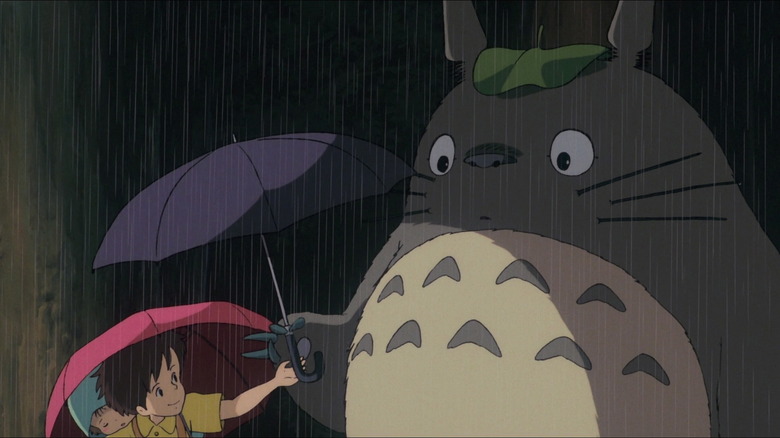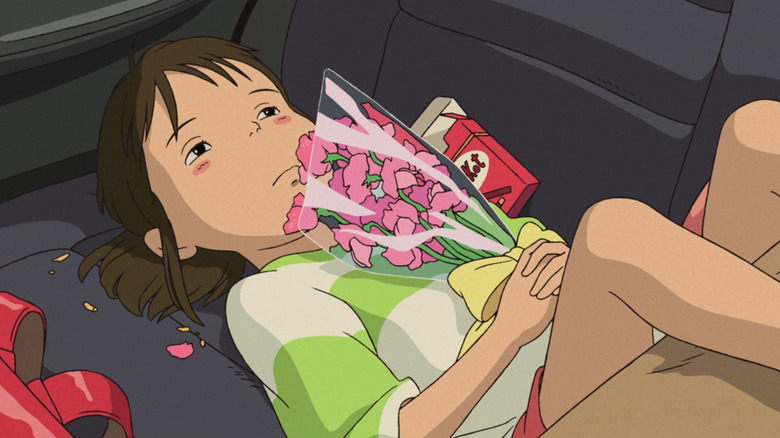How Hayao Miyazaki's Career Almost Ended Before It Began
The great Hayao Miyazaki almost quit being an animator before he even really got off the ground. Through Studio Ghibli, Miyazaki has produced a rich library of Japanese animated classics, with "Princess Mononoke" and "Spirited Away" being his breakthrough hits in the West. When he was starting out, however, Miyazaki went through a dry patch where he was close to giving up on the pursuit of his animation career.
Miyazaki himself related his experience in an essay published in 1988 before the release of "My Neighbor Totoro." The English translation (via Nausicaa.net) paints a picture of a frustrated young artist, who had found inspiration from Japan's first feature-length animated movie, "Hakujaden" (The Legend of White Snake), but who was running low on fuel until he saw the 1957 Soviet film, "The Snow Queen." As he explained it:
"It was 1963. I was a rookie animator at the Toei Animation Studio, but the work wasn't interesting. I couldn't agree to the projects I was working on, or the projects in plan. I was yet to abandon my dream to be a manga writer, and I was lost. The inspiration Hakujaden had given me was long gone, and I could only recall its imperfections. I doubt if I would have continued to work as an animator, had I not met Snow Queen at the screening hosted by the union.
"Snow Queen proved how much love could be put into a work of animation, and how much the movement of the pictures can sublimate to acting. It proved that when you draw a simple and strong emotion earnestly and purely, animation can strike people's hearts as much as the best works of other media can. I think that Hakujaden also had it despite its weakness in the story."
Getting over that first hump
Seeing "The Snow Queen" restored Miyazaki's faith in the animation medium and in his calling to be an animator. He said:
"I was thankful for the fact that I was an animator. Someday, we might have an opportunity. I decided to settle down and continue this job."
This essay from Miyazaki is revealing in other ways. It makes it clear he was no big fan of Disney or the "anime" abbreviation, at least at the time. He furthermore tries to unpack the idea of anime as "excessive expressionism" and likens the state of it to "an in-flight meal served on a jumbo jet." He also envisions, in an offhand manner, future developments in moviemaking, things like the 1 Second Everyday video diary or Richard Linklater's Oscar-winning film "Boyhood," where a person might make a movie by shooting it one bit at a time over a longer period of time.
According to a 2020 Statista survey, "My Neighbor Totoro" remains the most-watched Ghibli movie in Japan. The BBC has also voted "Spirited Away" the fourth-best film of the 21st century. To think that Miyazaki wrote the above words before either of those films came out just goes to show how imperative it is to stick with some things and not give up on them before they even have the chance to achieve full liftoff.
In "The Screwtape Letters," British author C.S. Lewis wrote of "the disappointment or anticlimax" that comes "on the threshold of every human endeavour" as a person "marks the transition from dreaming aspiration to laborious doing." Miyazaki's story illustrates the insightfulness of this. It highlights how hard work and perseverance, coupled with natural talent, can pay off in wondrous ways.
Miyazaki and Ghibli's other creators have been responsible for some of the greatest hand-drawn animated films of all time, something only made possible through their tenacity. For fans around the world, Miyazaki's filmography remains a beacon of inspiration, one that is set to continue yielding new works as he comes out of retirement for his 12th film, "How Do You Live?"

